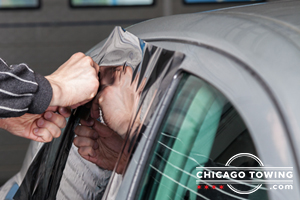Many drivers choose a style of window tinting for various reasons including aesthetics, a need for privacy, or heat mitigation. Whatever your reason is for tinting your car’s windows, it’s smart to understand the safety and price variabilities of this car customization service. Here’s a guide to all the different aspects of window tinting, as prepared by the towing experts at Chicago Towing.
Laws regarding Window Tinting
Find out what your official State regulations are regarding window tinting. Some States allow for all other tinting, and others regulate the legal level of tinting on front and back windows. In Missouri for example, window tinting can be placed on the top border of the windshield if it’s not reflective, and the rear of windows can be tinted to any level of darkness. The front side windows have to allow over 35 percent of light in. Laws have special conditions that allow for front window tinting for medical reasons if this applies to you, but you have to apply for a special permit using a doctor’s prescription.
Cost Factors
By setting your budget and the maximum amount of money you can spend on tinting, you will have more of an idea of what type of tint packages you can install. Do you want to add UV reflectivity to block out harmful solar rays, or do you want a specific tint color? These options will cost extra – and just as there’s many different types of paint you can paint your vehicle with, there’s tons of different types of window tinting products. The cheapest options are dyed film, and the most expensive (and highest quality type, when it comes to heat protection and fade resistance) are nano carbon ceramic film.
Tinting Categories
Tinting is either non reflective tinting or metallized film tinting. Metallized or reflective film isn’t legal in all States, but where it is, it is a popular choice due to its ability to provide both privacy and safety from both heat and solar UV rays. Non reflective rays keep out heat and block out bright trays from the eyes of drivers and passengers, but doesn’t reflect UV rays – making it a good choice for budget conscious car owners who aren’t concerned about UV reflectivity.

